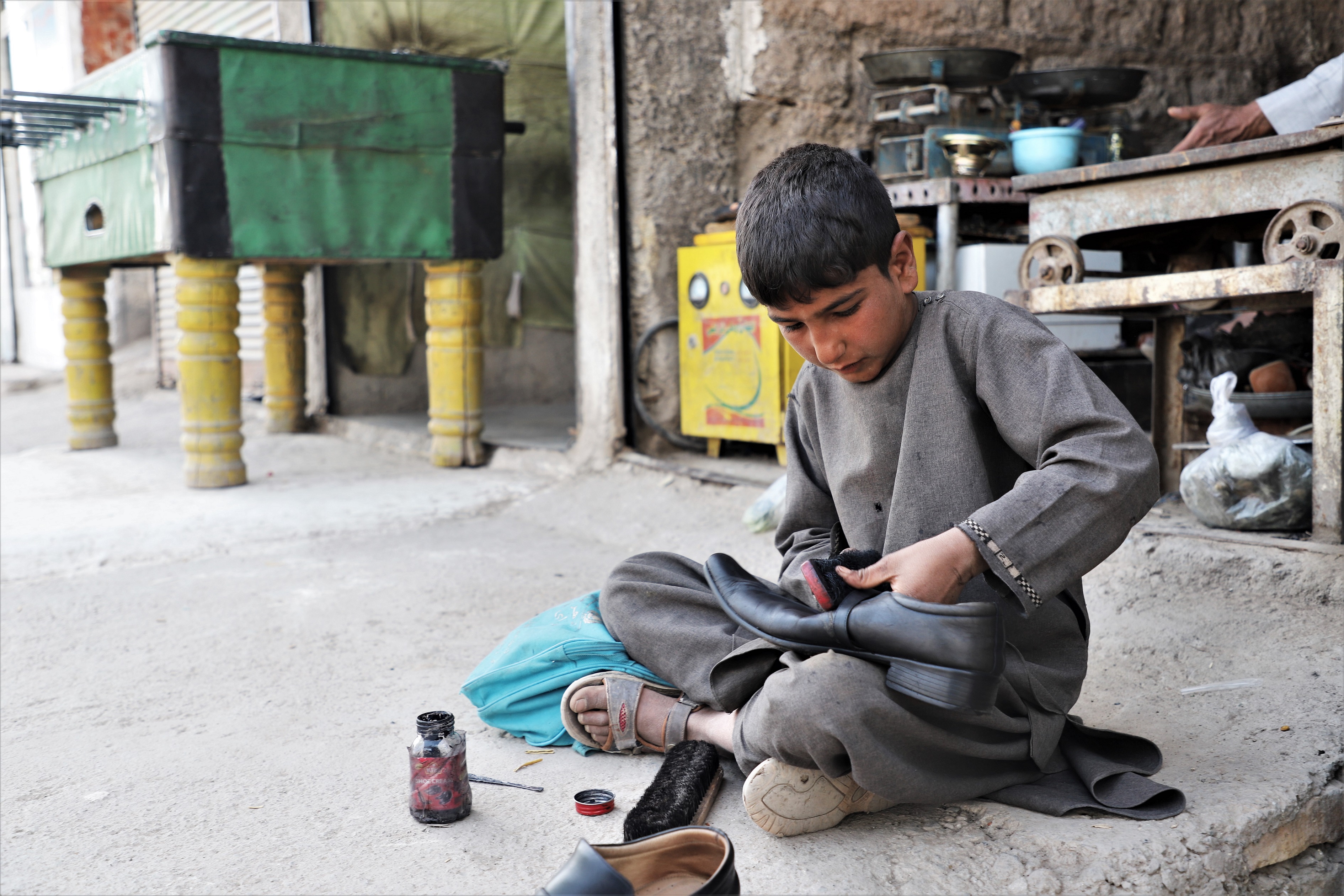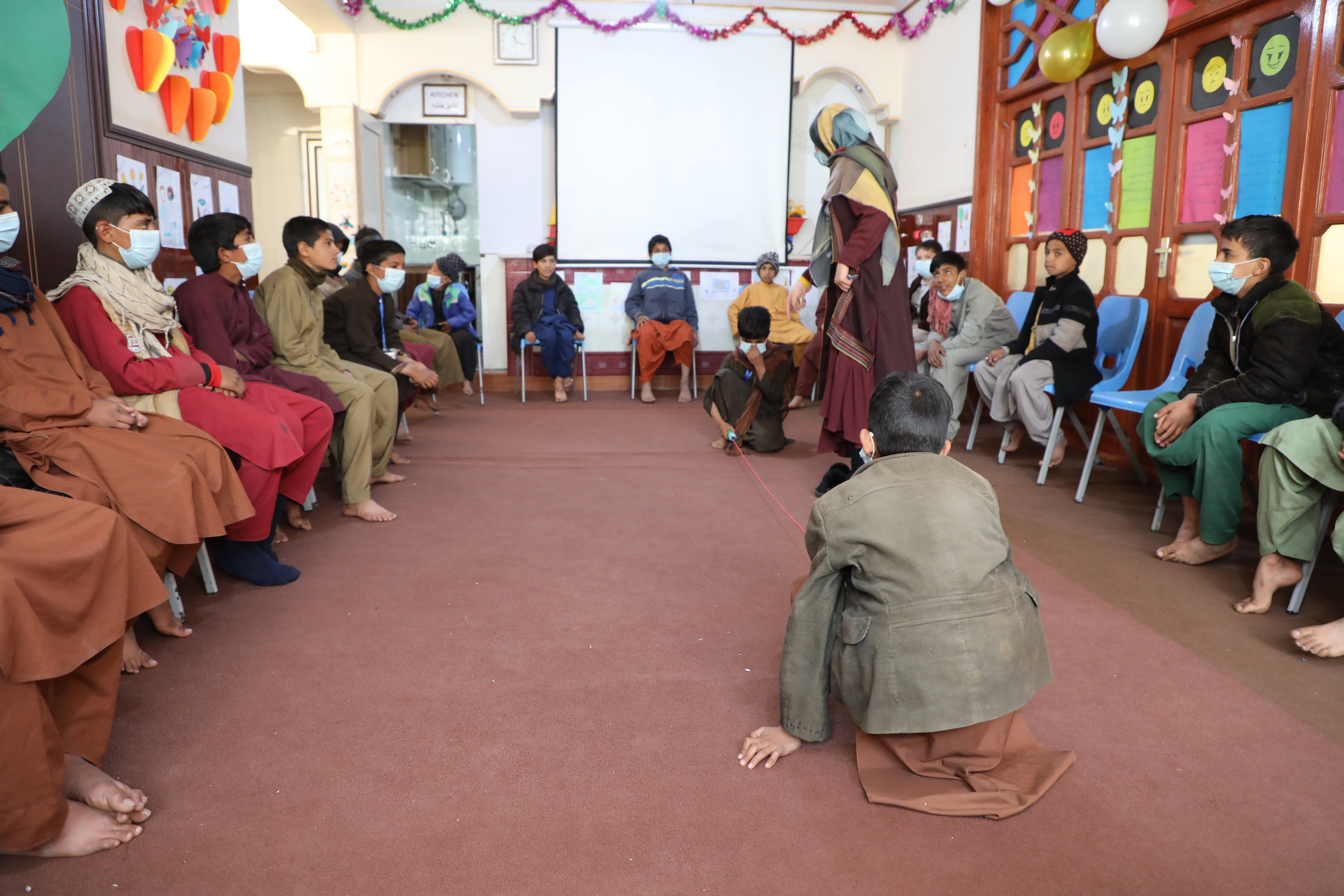One shoeshine boy’s hope for education
Amid roadside restaurants and bustling crowds in one of Herat’s busiest markets, 10-year-old Wakeel is working as a shoeshine boy. Until recently, he had never stepped foot inside a school, instead roaming the street of his city, equipped with a simple brush and several small glass bottles filled with shoe polish, working 11-hour days to provide an income for his family.
Each morning he gets up early with his two brothers, gulping down a cup of green tea, maybe munching on a piece of bread before venturing out into the city. If the three brothers don’t work, the family will go hungry, they say.
The 10-year-old who now lives in Herat city in western Afghanistan has moved from the rural Badghis province two years ago, his parents’ decision to relocate driven by hunger and poverty. In Herat, his family had hoped to find work easily, but instead, Wakeel and his two brothers had quickly become the family’s only breadwinners.
“I started when I was eight years old,” he said. “My father is sick and can’t work anymore, so my brothers and I work to buy bread.” On a good day, Wakeel makes up to 100 Afghani, just over US$1, with his brothers bringing in similar amounts. “I’ve never [formally] attended school,” he explained, then sits quietly. The need to purchase food has driven him onto the streets, but hunger still haunts him on a daily basis. During the day, he mostly works on an empty stomach he admits.

This worries his mother Shafiqa, 30. “I suffer because of my children’s unknown future,” she admits. “I am worried about what kind of future is awaiting them because they couldn’t go to school. I worry each day when my boys leave in the mornings,” she said, adding that she was mostly concerned with accidents and kidnapping [for ransom] - a recently increasing crime as poverty has soared.
Shafiqa is working too. She takes on cooking and cleaning jobs - and would like to do so more frequently - but the market is saturated. “I’m sorry that my children have to work,” she says.
Child labour is common throughout Afghanistan, with estimates showing that in the capital Kabul alone, according to UNICEF data at least 60,000 children work on the streets every day. Herat Municipality data suggests that in Herat, up to 10,000 could be working regularly, the previous government’s municipality estimated2. Since last year’s government change, these numbers have tripled.
Afghanistan’s economy has deteriorated to the point of total collapse; with almost the entire population - 95 percent - unable to access adequate food supplies. Almost 9 million people are just one step away from famine. With last August’s regime change, the country’s banking system has collapsed; the currency inflated. Billions of private Afghan assets remain frozen in US banks, meaning that countless people can’t access their savings. Wakeel has no savings, and on a bad day, he makes no money at all, because even the 20 Afghani (US$0.23) to have your shoes cleaned is difficult to afford for many.
But recently - despite Wakeel’s family’s hardships - things have been looking up a bit.
World Vision has worked in Herat for more than 20 years, and we have been setting up programmes for street-working children like Wakeel as well.
With your support, we were able to set up Herat’s first centre for street-working children, providing children between the ages of six and 12 the opportunity to receive health care, food rations, protection, education and life skills. The centre aims to target the root causes of child neglect and disempowerment while, at the same time, raising awareness of children’s rights and helping children like Wakeel attend school regularly.

Wakeel has been coming to World Vision’s centre once a week, receiving informal education, eating a meal and taking time to just play. The center is colourfully decorated: children’s drawings are put up on the walls, toys are neatly stacked up on a shelf. Upstairs, those children who don’t usually attend school have the chance to learn how to read and write.
Afghanistan’s needs have reached a new peak, and we are committed to responding to the country’s humanitarian catastrophe - both immediately and long-term. In the past six months, we have reached more than one million people, including children, providing them with life-saving food distributions as well as livelihood support. We want to ensure that children like Wakeel don’t carry the responsibility of having to provide for their families; instead, we want them to be able to focus on learning and growing.
Wakeel had long been worrying about not receiving an education. Seeing other children in their uniforms, carrying their books and backpacks to school had made him cry. He’d wanted to joint them so badly, but he knew his family could be starving if he didn’t work. But attending World Vision’s center had provided him with a new perspective: hope for an education after all.
*All names changed to protect people’s identity.